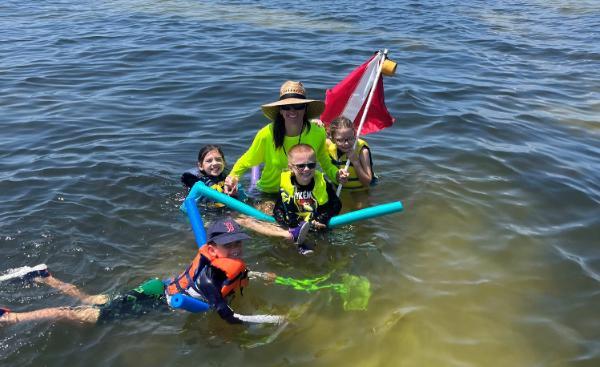
Eyes on Seagrass
Summer 2025 sampling will take place July 14th-31st.
Eyes on Seagrass is a citizen science volunteer monitoring program that has taken place in upper Charlotte Harbor and Lemon Bay since 2019. It was started by former Florida Sea Grant Charlotte County Extension Agent, Captain Betty Staugler, in response to angler concerns of increasing algae growth in Charlotte Harbor in 2019. Macroalgae, or seaweed, first appeared consistently in Charlotte Harbor starting in 2012 and has more recently been connected to local seagrass loss. Seagrass populations have been declining worldwide for a variety of reasons. Charlotte Harbor specifically saw a 23% loss in seagrass coverage between 2018 and 2021, which was troubling given how important seagrasses are both ecologically and economically in Florida. They act as a food source and habitat for many commercially and recreationally important fishery species, enhance water clarity, stabilize shorelines, and sequester carbon and nitrogen. The primary reason for seagrass die-off is increased nutrient levels in our waterbodies. Algae take up nutrients and grow faster than seagrasses, so when nutrients are readily available algae grows at rates that shade seagrasses and limits the amount of light required for them to do well.
Eyes on Seagrass methods were developed with close collaboration with scientists from UF to ensure that that the data collected by volunteers could be utilized in health assessments used by natural resource managers. Each spring and summer, volunteers are provided training and equipment necessary to survey preselected sites in upper Charlotte Harbor and Lemon Bay. Participants collect information on seagrass health, sediment, algae presence, and water quality.

INTERESTED IN VOLUNTEERING?
The best way TO RECEIVE up-to-date information is to SUBSCRIBE TO OUR MAILING LIST.
Register here to participate Summer 2025.
Training Options
The Sarasota Bay Estuary Program also offers in-person training for Sarasota County Participants that could be useful to anyone.
Survey Window: July 14th-31st, 2025
You are only required to visit your assigned sites once within this period!
VOLUNTEER RESOURCES & INFOMRATION
Eyes on Seagrass Sumner Sampling Sites
Release and Waiver of Liability (Adult)
Release and Waiver of Liability (Minor)
Once in late Spring (usually April) and once in Summer (usually July), volunteers will be asked to form sampling teams of at least three and survey their chosen sites within a defined two-week window. Sites only need to be surveyed once within the two-week sampling periods, and teams may participate in any combination of sampling events—Spring, Summer, or both!
Sampling teams will be responsible for transportation to their assigned sites via boat, kayak, canoe, paddleboard or wading from shore as well as personal snorkeling equipment—masks, fins, water shoes and gloves. Individuals are welcome to attend training but are not guaranteed connection to a team for sampling. Those who have never participated in the program should attend in-person training ahead of their first outing. Online instructional videos will be made available to repeat volunteers or those who can’t attend training.
Seagrass occurs locally in depths of 2-6 feet. While this a program is designed with volunteer enjoyment in mind, it should be noted that collecting data on the water can be as tiring as it is fun. Consider having at least one person in your sampling team that is a strong swimmer. You will be asked to complete a liability form and photo release before receiving your sampling equipment.
FAQ’S
I am a returning volunteer. Am I required to attend in person training?
In person training is never required for returning volunteers, although we do recommend it as a refresher and to help build community. This year, we will be publishing an e-learning training module that will be required for new and returning volunteers. The course will include the liability form—preventing you all from having to sign it year over year—and allow in person training to be more interactive. Upon completing the course, you will receive a certificate. Volunteers will have access to the course material going forward but will not be expected to complete it every year.
Will I receive equipment if I come to in-person training, or do I have to return to collect my equipment?
Equipment will be distributed at in person training. But there will be an opportunity for those that do not come to training to pick up survey kits before sampling begins.
What if I need to pick up equipment outside of business hours?
A member of Florida Sea Grant will be available at Centennial Park during business hours. If you need to connect outside of business hours, please call us to make arrangements. We are familiar with the nature of collecting field data and recognize that it may be a short lead time but try to provide us with as much advanced notice as possible.
Will I be expected to give my equipment back if I’m going to sample in the spring and the summer?
Nope! We suggest rinsing the equipment thoroughly and letting it dry before you store it to prevent mold and deterioration. However, we would like your equipment back as soon as you are done with it for the year, whether that be after the spring or summer sampling window.

Contact

Kate Rose Florida Sea Grant Agent (941) 764-4346 kate.rose0210@ufl.edu
Physical Address 1120 Centennial Boulevard Port Charlotte, FL 33953
Mailing Address 1120 Centennial Boulevard Port Charlotte, FL 33953
Hours Monday-Friday 8:00am – 5:00pm